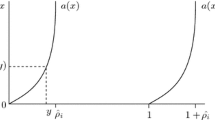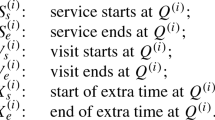Abstract
We study the expected delay in cyclic polling models with general ‘branching-type’ service disciplines. For this class of models, which contains models with exhaustive and gated service as special cases, we obtain closed-form expressions for the expected delay under standard heavy-traffic scalings. We identify a single parameter associated with the service discipline at each queue, which we call the ‘exhaustiveness’. We show that the scaled expected delay figures depend on the service policies at the queues only through the exhaustiveness of each of the service disciplines. This implies that the influence of different service disciplines, but with the same exhaustiveness, on the expected delays at the queues becomes the same when the system reaches saturation. This observation leads to a new classification of the service disciplines. In addition, we show monotonicity of the scaled expected delays with respect to the exhaustiveness of the service disciplines. This induces a complete ordering in terms of efficiency of the service disciplines. The results also lead to new rules for optimization of the system performance with respect to the service disciplines at the queues. Further, the exact asymptotic results suggest simple expected waiting-time approximations for polling models in heavy traffic. Numerical experiments show that the accuracy of the approximations is excellent for practical heavy-traffic scenarios.
Similar content being viewed by others
References
K.B. Athreya and P.E. Ney, Branching Processes (Springer, Berlin, 1971).
J.P.C. Blanc, Performance evaluation of polling systems by means of the power-series algorithm, Ann. Oper. Res. 35 (1992) 155–186.
S.C. Borst and O.J. Boxma, Polling models with and without switch-over times, Oper. Res. 45 (1997) 536–543.
S.C. Borst, O.J. Boxma and H. Levy, The use of service limits for efficient operation of multi-station single-medium communication systems, IEEE ACM Trans. Networking 3 (1995) 602–612.
O.J. Boxma and W.P. Groenendijk, Pseudo-conservation laws in cyclic service systems, J. Appl. Probab. 24 (1988) 949–964.
O.J. Boxma, Workloads and waiting times in single-server systems with multiple customer classes, Queueing Systems 5 (1989) 185–214.
G. Choudhury and W. Whitt, Computing transient and steady state distributions in poling models by numerical transform inversion, Performance Evaluation 25 (1996) 267–292.
E.G. Coffman, A.A. Puhalskii and M.I. Reiman, Polling systems with zero switch-over times: a heavy-traffic principle, Ann. Appl. Probab. 5 (1995) 681–719.
E.G. Coffman, A.A. Puhalskii and M.I. Reiman, Polling systems in heavy-traffic: a Bessel process limit, Preprint (1995).
S.W. Fuhrmann, A decomposition result for a class of polling models, Queueing Systems 11 (1992) 109–120.
C. Fricker and M.R. Jaïbi, Monotonicity and stability of periodic polling models, Queueing Systems 15 (1994) 211–238.
T. Kato, Perturbation Theory for Linear Operators (Springer, New York, 1966).
A.G. Konheim, H. Levy and M.M. Srinivasan, Descendant set: an efficient approach for the analysis of polling systems, IEEE Trans. Commun. 42 (1994) 1245–1253.
K.K. Leung, Cyclic service systems with probabilistically-limited, IEEE J. Selected Areas Commun. 9 (1991) 185–193.
H. Levy and M. Sidi, Polling models: applications, modeling and optimization, IEEE Trans. Commun. 38 (1991) 1750–1760.
H. Levy, M. Sidi and O.J. Boxma, Dominance relations in polling systems, Queueing Systems 6 (1990) 155–171.
H. Levy, Optimization of polling systems: the fractional exhaustive service method, Report, Tel-Aviv University (1988).
H. Levy, Binomial-gated service: a method for effective operation and optimization of polling systems, IEEE Trans. Commun. 39 (1991) 1341–1350.
D. Markowitz, Dynamic scheduling of single-server queues with setups: A heavy traffic approach, Ph.D. thesis, Operations Research Center, MIT, Cambridge, MA (1995).
R.D. Van der Mei and H. Levy, Expected delay analysis of polling systems in heavy traffic, to appear in Adv. in Appl. Probab. (1996).
R.D. Van der Mei, Polling systems in heavy traffic: higher moments of the delay, in: Teletraffic Contributions for the Information Age, eds. V. Ramaswamy and P.E. Wirth (Elsevier, Amsterdam, 1997) pp. 275–284.
M.I. Reiman and L.M. Wein, Dynamic scheduling of a two-class queue with setups, Technical Report, Sloan School of Management, MIT, Cambridge, MA (1994).
J.A.C. Resing, Polling systems and multitype branching processes, Queueing Systems 13 (1993) 409–426.
H. Takagi, Queueing analysis of polling models: an update, in: Stochastic Analysis of Computer and Communication Systems, ed. H. Takagi (North-Holland, Amsterdam, 1990) pp. 267–318.
H. Takagi, Queueing analysis of polling models: progress in 1990–1993, in: Frontiers in Queueing: Models, Methods and Problems, ed. J.H. Dshalalow (CRC Press, 1994).
Author information
Authors and Affiliations
Rights and permissions
About this article
Cite this article
van der Mei, R., Levy, H. Polling systems in heavy traffic: Exhaustiveness of service policies. Queueing Systems 27, 227–250 (1997). https://doi.org/10.1023/A:1019118232492
Issue Date:
DOI: https://doi.org/10.1023/A:1019118232492




